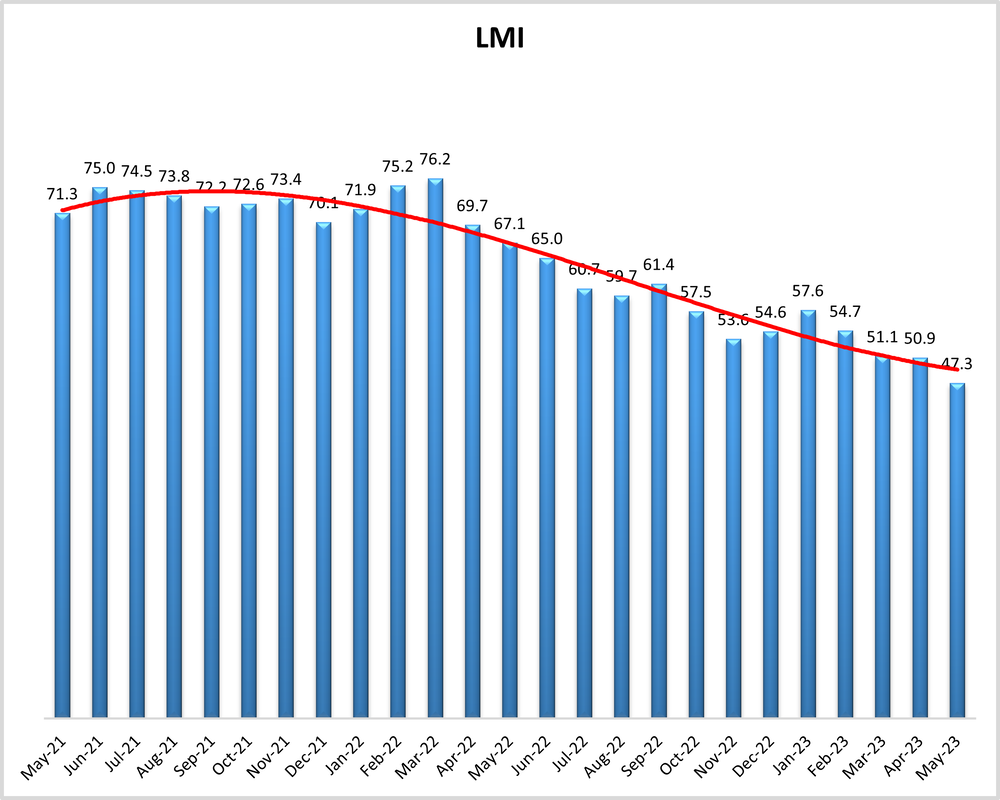Home » Logistics Managers Index contracts in May
Logistics Managers Index contracts in May
Softening freight market drives lower industry performance as LMI dips below growth threshold for the first time, researchers say.

Economic conditions in the logistics industry slowed in May, reflecting the ongoing effects of the freight recession, persistent inflation, and high interest rates. The Logistics Managers Index (LMI) fell to 47.3 in May, down nearly 4 points from April’s reading and dipping into contraction territory for the first time in the index’s six-and-a-half-year history, LMI researchers said Tuesday. The monthly LMI survey polls logistics managers nationwide about current and future business conditions. An LMI reading above 50 indicates growth, and a reading below 50 indicates contraction across the logistics economy.
A softening freight market is the driving factor behind the sluggish conditions, as available transportation capacity remains high and both transportation utilization and prices remain near record lows, according to LMI researcher Zac Rogers, assistant professor of supply chain management at Colorado State University.
“We are at a slow spot right now, the lowest spot we’ve been at in the [history] of the index,” Rogers said this week, noting that industry growth has been slowing from record highs since early in 2022.
The LMI’s inventory levels index contracted for the first time in May as well—dipping to a reading of 49.5—and the future conditions index for inventory is down as well: Logistics managers surveyed in May said they expect inventory levels to drop even lower over the next 12 months.
“So we’re now seeing inventories really finally drop—if we compare it to where we were in early 2022, when inventory was the biggest problem in the world,” Rogers said, referring to February 2022’s all-time high inventory-level reading of 80.2. “Some people see this as bad, but I think this is a huge accomplishment for a lot of supply chains. It really shows us that a lot of firms have been successful in rightsizing their inventories over the last year.
“What hasn’t gone as planned is that restockings haven’t happened yet, so [it’s] troubling on the freight side.”
The LMI is a monthly survey of logistics managers from across the country. It tracks industry growth overall and across eight areas: inventory levels and costs; warehousing capacity, utilization, and prices; and transportation capacity, utilization, and prices. The report is released monthly by researchers from Arizona State University, Colorado State University, Rochester Institute of Technology, Rutgers University, and the University of Nevada, Reno, in conjunction with the Council of Supply Chain Management Professionals (CSCMP).
Visit the LMI website to participate in the monthly survey.
Consulting & Professional Services Publications & Associations Supply Chain StrategyKEYWORDS LMI LMI - Logistics Managers' Index
Related Articles

Victoria Kickham started her career as a newspaper reporter in the Boston area before moving into B2B journalism. She has covered manufacturing, distribution and supply chain issues for a variety of publications in the industrial and electronics sectors, and now writes about everything from forklift batteries to omnichannel business trends for DC Velocity.
Copyright ©2024. All Rights ReservedDesign, CMS, Hosting & Web Development :: ePublishing